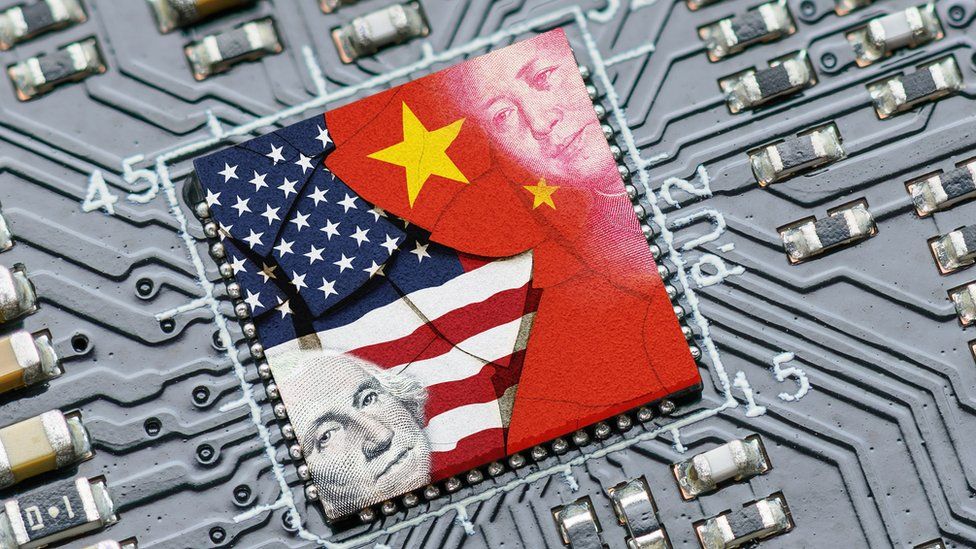
By Mariko Oi
Business reporter
China has hit back at the Biden administration’s decision to impose new restrictions on advanced chip exports.
The foreign ministry said the curbs “violate the principles of the market economy and fair competition”.
The measures target chipmaking tools as well as advanced chips, including two from market leader Nvidia.
The move is being seen as an attempt to close loopholes that became apparent after an initial wave of chip controls last October.
America said the measures were designed to prevent China from receiving cutting-edge technologies that it could use to strengthen its military, especially in the field of artificial intelligence (AI).
The Biden administration has denied it was trying to hurt China economically, but Beijing’s foreign ministry branded the move “forced de-coupling for political purposes”.
Chinese stock markets which feature chip-related companies have seen modest falls since the announcement. The CSI Semiconductor Index dropped 1.4% on Wednesday, while the STAR Chip Index lost 1.2%.
An index tracking China’s AI companies also closed 1.8% lower.
US chip stocks have also seen falls as the curbs also hit American firms Advanced Micro Devices and Intel.
Nvidia has said in a filing that the new export restrictions will block sales of two high-end artificial intelligence chips it created for the Chinese market – A800 and H800. It said that one of its gaming chips will also be blocked.
Although the curbs also affect other chip makers, analysts believe Nvidia will be hit the hardest because China accounts for up to 25% of its revenues from data centre chip sales. Nvidia’s shares, which are considered a star stock, fell by as much as 4.7% in the wake of the announcement.
The Semiconductor Industry Association, which represents 99% of the US semiconductor industry by revenue, said in a statement that the new measures are “overly broad” and “risk harming the US semiconductor ecosystem without advancing national security as they encourage overseas customers to look elsewhere”.
Two months ago, China retaliated by restricting exports of two materials, gallium and germanium, which are key to the semiconductor industry.
China is by far the biggest player in the global supply chain of gallium and germanium. It produces 80% of the world’s gallium and 60% of germanium, according to the Critical Raw Materials Alliance (CRMA) industry body.
The materials are “minor metals”, meaning that they are not usually found on their own in nature, and are often the by-product of other processes.
Besides the US, both Japan and the Netherlands – which is home to key chip equipment maker ASML – have also imposed chip technology export restrictions on China.
The constant tit-for-tat between the world’s two biggest economies has raised concerns over the rise of so-called “resource nationalism” when governments hoard critical materials to exert influence over other countries.








